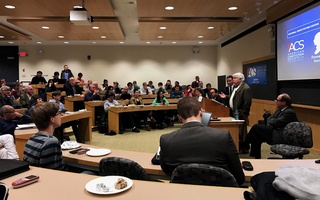The committee tasked with implementing the College’s new policy penalizing members of single-gender final clubs and Greek organizations is on track to meet its deadline to offer recommendations to Dean of the College Rakesh Khurana next semester.{shortcode-4663a5ced1845780e95d8d4fd4c918423b2318ea}
“Each sub-committee is preparing to share their initial recommendations with the Steering Committee, which will help inform the Committee’s final recommendations,” College spokesperson Rachael Dane wrote in an email.
The implementation committee, whose full membership was announced Oct. 31, is comprised of a steering committee and three sub-groups: “Governance and Implementation,” “Social Groups and Campus Community,” and “Communications and Benchmarking.”
Members of subcommittees have met with student group leaders, fellowship recipients, and varsity athletes over the course of the past month to discuss how the policy could affect these different groups and inform their own recommendations to the steering committee.
The steering committee—which is chaired by Douglas Melton, a faculty dean of Eliot House and a University professor, and Kay K. Shelemay, a professor in the Music and the African and African American Studies departments—establishes and guides the work of the subcommittees and will ultimately make recommendations to Khurana about the extensive logistics of implementing the new policy and recommending methods for enforcement. Faculty members and students sit on the steering committee.
While the subcommittees are preparing to provide initial recommendations to the steering committee, Shelemay wrote in an email that the larger implementation committee has “not completed our deliberations yet.”
Last spring, Harvard administrators announced an unprecedented policy that will ban members of unrecognized single-gender social groups from becoming leaders of recognized student organizations, varsity team captains, or recipients of top College-endorsed fellowships, starting with the Class of 2021.
The committee’s work in implementing the policy continues amid criticism from alumni, faculty, and students.
Prominent former administrators, national media outlets, and hundreds of women have been vocal in their opposition to the College’s policy, though members of the Harvard Corporation, various students, and varsity coaches have expressed support.
In particular, a motion presented by Harry R. Lewis ’68 at Tuesday’s Faculty meeting—stating “Harvard College shall not discriminate against students on the basis of organizations they join”—has cast the committee’s work in uncertainty. He believes a vote in favor of the motion will overturn the policy, while the motion’s opponents argue the policy is set in stone.
Tuesday’s meeting was adjourned before the motion could be put to a Faculty vote, with discussion of the legislation tabled until the next full meeting of the Faculty in February. In the past, University President Drew G. Faust has not specified what effect, if any, a Faculty vote in favor of Lewis’s motion would have on the implementation of sanctions.
—Staff writer Derek G. Xiao can be reached at derek.xiao@thecrimson.com. Follow him on Twitter @derekgxiao.
Read more in College News
How Did the UC Candidates Spend Their Money?Recommended Articles
-
 Sanctions Could Be Subject to Change, Faust Says
Sanctions Could Be Subject to Change, Faust Says -
 Majority of Student Voters Oppose College Sanctions in UC Ballot
Majority of Student Voters Oppose College Sanctions in UC Ballot -
 Lewis Headlines Debate on Constitutionality of Final Club Sanctions
Lewis Headlines Debate on Constitutionality of Final Club Sanctions -
Sanctions Set, But Implementation Open to Debate, Lee SaysAs faculty debate whether the College should have a policy penalizing members of final clubs and Greek organizations, the senior fellow of Harvard’s highest governing body said the policy itself will not be revoked.
-
 Faculty Council Declines to Vote on Sanctions Motion
Faculty Council Declines to Vote on Sanctions Motion -
 After Tense Meeting, Sanctions Motion Tabled Until 2017
After Tense Meeting, Sanctions Motion Tabled Until 2017













